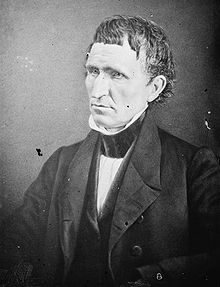George McDuffie
George McDuffie (born August 10, 1790 in Columbia County , Georgia , † March 11, 1851 in Sumter County , South Carolina ) was an American politician and Governor of South Carolina from 1834 to 1836 . He also represented this state in both chambers of Congress .
Early years and political advancement
George McDuffie attended Moses Waddel's School in Willington and then studied law at South Carolina College . He was admitted to the bar in 1814. He then practiced alone in Pendleton and later together with a partner Eldred Simkins in Edgefield . His political career began in 1818 when he was elected to the South Carolina House of Representatives . He stayed there for two years. Between 1821 and 1834 he represented his state in the US House of Representatives in Washington . In 1832 he was a delegate to the convention in South Carolina, where the nullification crisis was discussed. There he was a proponent of the nullification doctrine . Originally he had not been an advocate of state rights, but under the influence of John C. Calhoun he had changed his mind. He was at odds with President Andrew Jackson on this point, and on banking policy .
Governor and senator
In 1834, McDuffie was elected the new governor of his state. He took office on December 11th of that year and held it until December 1836. During his tenure, the Bank of Charleston was founded in 1835 . The governor subsequently developed into a classic southern state politician before the civil war . He fought for the rights of the individual states and exacerbated slavery . Former slaves who wanted to return to South Carolina as free people were immediately re-enslaved.
At the end of his term, McDuffie was not allowed to run for another term immediately because of a constitutional clause and therefore had to resign from office. He was a judge in a federal district court and sat from December 23, 1842 until his resignation on August 17, 1846 for the Democrats in the United States Senate . There he was chairman of the committee on foreign affairs. Even during this time he remained true to the cliché of the classic southerners and got involved in two pistol duels. He was seriously injured in the spine. As a result, he fell into depression and eventually died of the consequences of the injuries. He was married to Mary Rebecca Singleton. The couple had a child.
According to him, McDuffie County named in Georgia.
Web links
- George McDuffie in the National Governors Association (English)
- South Carolina Information Highway (English)
- George McDuffie in the Biographical Directory of the United States Congress (English)
- George McDuffie in the database of Find a Grave (English)
| personal data | |
|---|---|
| SURNAME | McDuffie, George |
| BRIEF DESCRIPTION | American politician |
| DATE OF BIRTH | August 10, 1790 |
| PLACE OF BIRTH | Columbia County , Georgia |
| DATE OF DEATH | March 11, 1851 |
| Place of death | Sumter County , South Carolina |



